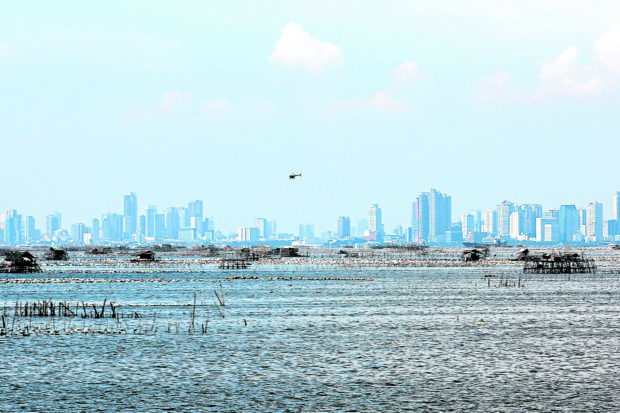Water quality in Manila Bay has improved – DENR

LESS DIRTY | Although not yet fit for swimming, government efforts to rehabilitate Manila Bay appear to be paying off. (INQUIRER FILE PHOTO)
MANILA, Philippines — The gradual decrease in fecal coliform levels following almost four years of rehabilitation efforts has improved water quality in Manila Bay, the Department of Environment and Natural Resources (DENR) said on Monday.
Data from the Manila Bay Coordinating Office (MBCO) showed that as of October 2022, the fecal coliform level in Manila Bay had gone down to 51,300 most probable number per 100 milliliters (MPN/100mL) from 126,000 MPN/100mL in 2019.
The DENR said the standard coliform level for coastal waters to be safe for swimming and other recreational activities was at only 100 MPN/100mL.
Upon the implementation of the rehabilitation efforts in January 2019, Manila Bay was declared a “no swimming zone.” Then Environment Secretary Roy Cimatu said bathing in Manila Bay could expose people to high levels of fecal coliform bacteria and increase their chances to develop illnesses.
Back then, the DENR recorded a fecal coliform count of 7.9 million MPN/100mL from the sampling station at the Padre Faura drainage outfall.
Article continues after this advertisement“The government’s ongoing rehabilitation efforts appeared to be paying off as the water quality within the Manila Bay region continued to improve this year,” the DENR said in a statement on Monday.
Article continues after this advertisementTwo of the seven projects in Manila Baywalk have been completed. These include the solar-powered comfort rooms on the streets of Padre Faura and Abad, as well as the security, operation, and maintenance of the sewage treatment plant (STP).
Sustainable interventions
The DENR said the remaining five projects were at 83 to 96 percent completion.
“At the Libertad Channel, which is also a hot spot in water pollution, dredging activities were completed while a solar-powered STP with a capacity of 10 million liters per day is already built and only awaiting commissioning,” it said.
The government agencies, which are part of the Manila Bay rehabilitation efforts would adopt sustainable management interventions this year and also initiate community-based strategies in solid waste management.
Jacob Meimban, executive director of MBCO, said the STP projects were expected to significantly reduce pollution in the major waterways.
“At the moment, we are also working on the institutionalization of the MBCO to ensure continuity in the implementation of the projects and activities under the Manila Bay Rehabilitation Program,” he said.